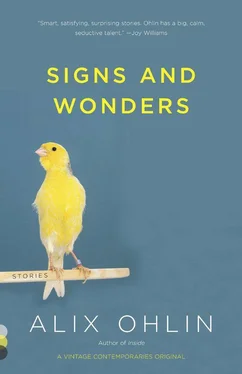Alix Ohlin - Signs and Wonders
Здесь есть возможность читать онлайн «Alix Ohlin - Signs and Wonders» весь текст электронной книги совершенно бесплатно (целиком полную версию без сокращений). В некоторых случаях можно слушать аудио, скачать через торрент в формате fb2 и присутствует краткое содержание. Год выпуска: 2012, ISBN: 2012, Издательство: Random House, Inc., Жанр: Современная проза, на английском языке. Описание произведения, (предисловие) а так же отзывы посетителей доступны на портале библиотеки ЛибКат.
- Название:Signs and Wonders
- Автор:
- Издательство:Random House, Inc.
- Жанр:
- Год:2012
- ISBN:9780307948649
- Рейтинг книги:3 / 5. Голосов: 1
-
Избранное:Добавить в избранное
- Отзывы:
-
Ваша оценка:
- 60
- 1
- 2
- 3
- 4
- 5
Signs and Wonders: краткое содержание, описание и аннотация
Предлагаем к чтению аннотацию, описание, краткое содержание или предисловие (зависит от того, что написал сам автор книги «Signs and Wonders»). Если вы не нашли необходимую информацию о книге — напишите в комментариях, мы постараемся отыскать её.
Signs and Wonders — читать онлайн бесплатно полную книгу (весь текст) целиком
Ниже представлен текст книги, разбитый по страницам. Система сохранения места последней прочитанной страницы, позволяет с удобством читать онлайн бесплатно книгу «Signs and Wonders», без необходимости каждый раз заново искать на чём Вы остановились. Поставьте закладку, и сможете в любой момент перейти на страницу, на которой закончили чтение.
Интервал:
Закладка:
“You deed him?” Reena said. Tears clustered once again in her eyes, though this time they were tears of anger, or maybe anguish, she wasn’t sure; certainly it felt adolescent and hormonal. “Laureen, could you just stop, please, acting like this is high school? I know you mean well but I don’t need to go back to high school.”
Laureen put her hands on her hips. “It wouldn’t kill you,” she said, “to have a little fun. You act like having fun would actually hurt, like you’re allergic to it or something. Men like women who like fun. I’m sure Jason and Bobby would have liked a little fun, too.”
It was the first time on the trip that either of them had spoken those names. Reena felt sick. She’d never get away from it, how much everything was her own fault.
“Oh, honey,” Laureen said. “Forget I said that.”
Reena shook her head. She felt as if her arms, her neck, her ears were on fire. If she could have, she would’ve jumped into the water and swum to the ship, gotten into bed and pulled the covers over her head.
“Hey,” Laureen said. “The sea lions.”
They lay in a line on the beach, flopped down like cushions, vulnerable and dopey, like overweight puppies. They were almost preposterously cute. Reena immediately wanted to touch them, even knowing that she couldn’t, that they weren’t pets, wouldn’t even be good hypothetical pets. But how could anyone resist them? The fight she and Laureen were having disintegrated, shelved until there was less-pressing cuteness in front of them. Ben took Hans by the arm and walked him down the beach, pointing out some feature of the landscape, a soothing, fatherly gesture. The Japanese couple crouched and bent calisthenically, their telephoto lenses zooming.
Laureen and Reena stood quietly, not too close and not too far, listening to the occasional thwapping of the sea lions’ glistening tails. Two raised their heads, but overall they didn’t seem disturbed.
Maybe they were used to tourists. Or maybe this invasion was so far down their list of sea lion priorities — fish, swim, bask on the beach — that they had no concept of it.
The biologist guide had joined them, and was talking about threats to the sea lions, from skin infections due to polluted waters to plastics that could strangle or choke. She talked about how their mothers nursed younger and older pups at the same time; if the younger one was too much weaker than its sibling, then it would die. She droned on relentlessly, reciting these terrible things so matter-of-factly, without emphasis. Without tears.
Reena’s heart squeezed. She reached out and took her aunt’s hand in hers.
“Look,” she kept saying, even though she knew Laureen already saw. “Just look.”
The Assistants

“If I died, would you come to my funeral?”
“Why would you ask me that? We barely know each other.”
“That’s why I wondered,” Martin said. We were drinking Red Stripes, just the two of us, in a dive bar on the Lower East Side. “Would you come? Would you be that person who everybody at the service was wondering about? You know, whispering in the pews, ‘Who is she?’ ”
“Nobody would say that.”
“But really — would you come?”
“Would it be in New York?”
“Probably not.”
“I doubt it, then,” I said. “I doubt I could get off work.”
“They wouldn’t give you time off for a funeral?”
I drank my beer. “I just started,” I said. “I’m just an assistant.”
Back then, we were all assistants. We worked at magazines, galleries, or nonprofits. We lived with roommates in tiny apartments in questionable neighborhoods. My bedroom was just big enough for a twin mattress. My friend Sarah shared a room with a guy who was a bartender in Chelsea; she slept there at night, and he slept there during the day. Martin lived by himself, which sounded luxurious until we went over there one night and discovered his studio was a converted supply closet; he washed his dishes in a deep sink spattered with stains. Millie also lived by herself, we assumed under similar conditions, until we went over one night and found she had a corner one-bedroom in the West Village with Pottery Barn furniture and jute rugs. It was a surprise to us, learning that Millie was rich, and it upset me in particular; I was shocked anyone under thirty could live like that, which will tell you something about how young I was at the time. It would have splintered our group, except that things were coming apart already.
Sarah and I worked together, at a literary magazine whose downtown office was a dusty shambles of manuscripts and review copies and file cabinets stuffed with carbon copies of letters, author contracts, galleys, and production details. At first Sarah was my only friend in the city, and she’d gotten me the job. I knew her from high school; she’d gone to college with the bartender roommate, who knew Millie from his hometown in Connecticut, which he’d always presented as hardscrabble and blue-collar but which description, after seeing Millie’s apartment, we began to doubt. The five of us invited one another to whatever work-related parties we knew about, improvising dinners out of the cheese cubes and cheap wine; we bartered the tickets and CDs and passes and book galleys that were the currency of assistants, and cadged free drinks at the bar in Chelsea if it was a busy night and the manager wasn’t around. Six months after I moved to New York, straight out of school, we’d become a running pack. We hung out on the weekends and called one another nearly every day. When my mother, back home in Toronto, worried I might be lonely, I laughed and said, “I have three roommates, I’m never alone,” but the running pack was a secret I clutched close to myself, better than money.
How Martin got involved is something I can’t remember. He was tall and gangly and perpetually stooped over as he listened to what other people had to say. He came from the South, with a lilting, musical twang, and was an assistant at a foundation that dispensed grants to artists; this suited him perfectly, because he himself seemed both courtly and impoverished. He wore chinos and bucks and looked less preppy than messy; his clothes didn’t fit well, his hair too long and his skin pocked with acne damage. He sweated even when it wasn’t hot. I remember one night, Sarah and Martin had planned to see a movie, but she went on a date instead. So Martin picked me up at work and we headed to the theater. After a block or two he abruptly said, “Excuse me,” then ducked into a bodega and emerged carrying two tallboys in a paper bag, one of which he was already drinking. “I can’t sit in the dark without drinking a bit,” he said. He sounded both apologetic and matter-of-fact. He finished the first beer before we got to the corner and the second as we reached the theater. As the movie started, he pulled out a silver flask and sipped.
I liked the flask. I was charmed by this kind of apparatus, the accessory of a more glamorous time.
Afterward, we went to a bar on Ludlow, and that’s when he asked me the question about his funeral. I asked if he thought about dying a lot, and he shook his head. He had other fears, he said. Darkness. Confined spaces. Wide-open spaces. Elevators. Escalators. Chewed pens.
“Pens?” I said.
“Those tips,” he said, and shuddered. “Bite marks in plastic. People hand you one and expect you to pick it up? With I don’t know what germs?” He shook his head again. “That’s just crazy.”
I looked at him. “It must be hard for you to get around.”
He studied me back, his head cocked to one side. His eyes were blue, watery, and kind. I felt the full force of his attention, which was not sexual but not asexual either; it felt complete somehow, as if he were taking in every aspect of me.
Читать дальшеИнтервал:
Закладка:
Похожие книги на «Signs and Wonders»
Представляем Вашему вниманию похожие книги на «Signs and Wonders» списком для выбора. Мы отобрали схожую по названию и смыслу литературу в надежде предоставить читателям больше вариантов отыскать новые, интересные, ещё непрочитанные произведения.
Обсуждение, отзывы о книге «Signs and Wonders» и просто собственные мнения читателей. Оставьте ваши комментарии, напишите, что Вы думаете о произведении, его смысле или главных героях. Укажите что конкретно понравилось, а что нет, и почему Вы так считаете.












